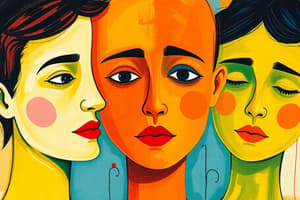Podcast
Questions and Answers
What emotions are typically linked to rejection or unfair treatment?
What emotions are typically linked to rejection or unfair treatment?
- Excitement and hope
- Fear and hate (correct)
- Confidence and pride
- Joy and contentment
Which of the following is a potential consequence of losing a loved one?
Which of the following is a potential consequence of losing a loved one?
- Jealousy and pride
- Anger and resentment
- Happiness and satisfaction
- Grief and anxiety (correct)
How can maintaining good social relationships affect emotional well-being?
How can maintaining good social relationships affect emotional well-being?
- It can foster jealousy
- It can prevent emotional distress (correct)
- It can lead to sadness
- It can cause increased anxiety
What emotion is most commonly associated with being treated badly or losing a partner?
What emotion is most commonly associated with being treated badly or losing a partner?
What relationship dynamic is indicated by healthy feelings?
What relationship dynamic is indicated by healthy feelings?
What is conscious emotion characterized by?
What is conscious emotion characterized by?
At what age can babies begin to recognize emotions?
At what age can babies begin to recognize emotions?
What is automatic affect primarily experienced as?
What is automatic affect primarily experienced as?
Which brain region is primarily responsible for regulating emotions?
Which brain region is primarily responsible for regulating emotions?
In contrast to automatic affect, full-blown emotion takes:
In contrast to automatic affect, full-blown emotion takes:
What aspect is NOT associated with emotions?
What aspect is NOT associated with emotions?
What happens to emotional feelings upon recognizing a stimulus?
What happens to emotional feelings upon recognizing a stimulus?
Emotions serve as a bridge between which two components?
Emotions serve as a bridge between which two components?
What role do emotions play in decision-making?
What role do emotions play in decision-making?
What is the risk-as-feelings hypothesis primarily concerned with?
What is the risk-as-feelings hypothesis primarily concerned with?
Which emotion is particularly noted for motivating caution and planning?
Which emotion is particularly noted for motivating caution and planning?
How do strong conscious emotions affect decision-making in risky situations?
How do strong conscious emotions affect decision-making in risky situations?
In the context of decision-making, what does 'automatic affective reactions' refer to?
In the context of decision-making, what does 'automatic affective reactions' refer to?
What negative emotions are associated with maladaptive decision-making?
What negative emotions are associated with maladaptive decision-making?
What is a potential effect of sexual arousal on decision-making?
What is a potential effect of sexual arousal on decision-making?
How do emotions influence perceptions of probabilities in decision-making?
How do emotions influence perceptions of probabilities in decision-making?
What type of arousal cannot be converted into 'bad' arousal according to the studies mentioned?
What type of arousal cannot be converted into 'bad' arousal according to the studies mentioned?
Which of the following states has been mentioned as a neutral state in the studies?
Which of the following states has been mentioned as a neutral state in the studies?
What emotion is described as usually being chemically induced?
What emotion is described as usually being chemically induced?
According to the research, what can 'bad' arousal not be converted into?
According to the research, what can 'bad' arousal not be converted into?
Which of the following does not represent a 'good' emotional state in the context of the research?
Which of the following does not represent a 'good' emotional state in the context of the research?
What is the result of experiencing pleasant arousal according to the research?
What is the result of experiencing pleasant arousal according to the research?
Which of the following is stated to be generated by actual events?
Which of the following is stated to be generated by actual events?
What type of stimulant is discussed as inducing neutral states?
What type of stimulant is discussed as inducing neutral states?
What is a primary difference observed in boys' and girls' games?
What is a primary difference observed in boys' and girls' games?
How do boys typically handle disputes in their games?
How do boys typically handle disputes in their games?
What pattern regarding marital conflicts is observed between husbands and wives?
What pattern regarding marital conflicts is observed between husbands and wives?
What do social norms suggest about men's emotional expression?
What do social norms suggest about men's emotional expression?
Which statement best summarizes the emotionality of men and women?
Which statement best summarizes the emotionality of men and women?
How do husbands typically react during arguments, according to the observations?
How do husbands typically react during arguments, according to the observations?
In terms of emotions, how do boys and girls deal differently in play?
In terms of emotions, how do boys and girls deal differently in play?
What conclusion can be drawn about women's emotionality compared to men’s?
What conclusion can be drawn about women's emotionality compared to men’s?
Flashcards are hidden until you start studying
Study Notes
Conscious Emotion vs. Automatic Affect
- Conscious emotion is a strong, unified feeling experienced at a conscious level.
- Automatic affect is a liking or disliking of something, often occurring outside of conscious awareness.
- Automatic affect is a rapid, initial evaluation of something as good or bad, happening within milliseconds.
- Conscious emotion, in contrast, develops more slowly.
- Both conscious emotion and automatic affect are vital for human experiences and decision-making.
Emotional Arousal
- Emotions involve both mental and physical aspects.
- Emotional states can be induced or triggered by physical events or chemical changes in the body.
- Emotional arousal is typically categorized as good or bad, and it's difficult to convert one type into the other.
Emotional Connections & Relationships
- Positive feelings often result from healthy relationships, while negative emotions frequently stem from damaged relationships.
- Maintaining strong social connections can be crucial for overall well-being and emotional stability.
Emotions Impacting Decisions
- Emotions play a vital role in decision-making, both positively and negatively.
- Emotions can help guide decisions by highlighting good and bad outcomes.
- Strong emotions, particularly negative ones, can skew decision-making and lead to risky or harmful choices.
- The risk-as-feelings hypothesis suggests that people rely on their emotional reactions to assess risk.
Gender and Emotional Expression
- Social norms often pressure men to suppress emotional expression.
- Women tend to be more willing to openly express emotions, potentially leading to the perception of greater female emotionality.
- Men may actually experience emotions as intensely as women, but they may be less likely to acknowledge or express them.
- The difference in emotional expression between genders may be influenced by social expectations rather than inherent differences.
Studying That Suits You
Use AI to generate personalized quizzes and flashcards to suit your learning preferences.




